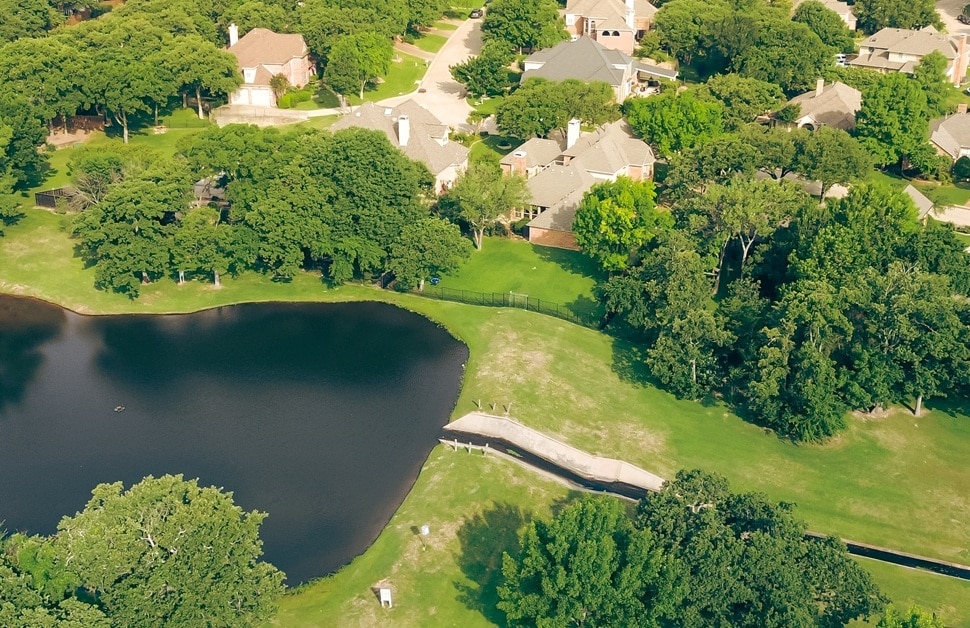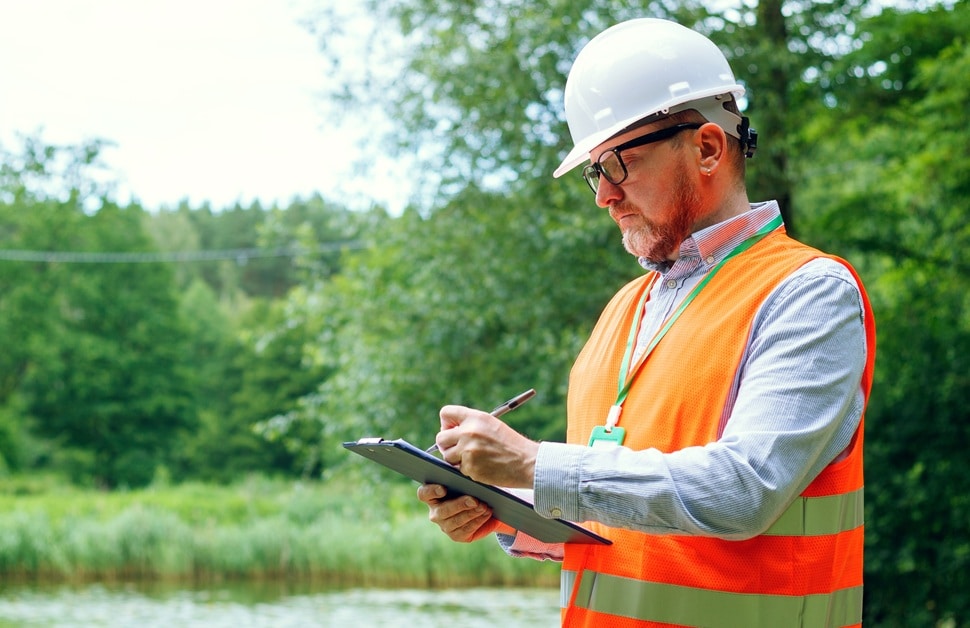
Flood Risk Assessments
If a proposed development site is in or near areas that are known to be susceptible to flooding, assessing flood risk will be an important part of the planning process. Likewise, it will be crucial to assess flood risk if the risk of flooding could potentially be higher as a result of the development.
Multiple sources of flooding can affect the site area of a development, including groundwater, reservoir flooding, surface water, rivers or the sea. Especially in known flood risk areas, the local planning authority and Lead Local Flood Authority (LLFA) will likely insist that you need a flood risk assessment (FRA) as a way of identifying possible sources of flooding and supporting planning applications.
What is a Flood Risk Assessment?
A flood risk assessment is a site-specific survey and report that considers all potential sources of flood hazards on a development site at an early stage in the process. Available data is used along with any existing and relevant flood risk information about the site, as well as detailed information retrieved from the site, such as flood depths and modelled flood levels.
Various benefits can come from arranging flood risk assessment services, but none more than being seen to be compliant with local and national policy requirements. With flood risk assessments, for example, you can operate within the National Planning Policy Framework (NPPF) and Planning Practice Guidance, and demonstrate that you are taking climate change allowances into account.
Flood Consequence Assessment (FCA)
FRAs apply to all parts of the UK, but with different agencies depending on location – Natural England and the Environment Agency for England, Natural Resources Wales for Wales, the Scottish Environment Protection Agency (SEPA) for Scotland, and the Department for Infrastructure (DfI) Rivers for Northern Ireland.
Not only that, but in Wales, a flood risk assessment (FRA) is known as a flood consequence assessment (FCA). The main difference between the two is that while an FRA in England follows the National Planning Policy Framework (NPPF) and Planning Practice Guidance, an FCA in Wales follows Technical Advice Note 15 (TAN15): Development, Flooding and Coastal Erosion. It also relies on the Welsh government to provide advice on surface water management issues.
Other than that, the flood consequence assessment level is higher, offering further quantitative analysis when it comes to potential flood risk issues, and the flood consequence assessment report offers more sources of flood risk mitigation and additional possible measures to prevent any threat of flood risk posed to the location in the future. It also has an emphasis on the effect of extreme flood outline levels on evacuation, safety and resilience.
When is a Flood Risk Assessment Required?
If a development falls within one of the nearby flood zones shown on the flood map for planning from the Environment Agency, an assessment is required. Flood maps indicate the particular risk of flooding on the site. Within flood zone 1, the land has a low probability of river or sea flooding, whereas it moves up to a medium probability and high probability within flood zones 2 and 3.
It is to be expected that an FRA would be needed on sites within flood zone 2 or 3, but flood risk assessment requirements also call for an evaluation on sites outside of flood zone 1 in certain circumstances. For example, if the development is over 1 hectare in size, suffers from critical drainage problems or surface water flooding risk, or involves a change of use to a more vulnerable class, an assessment will be needed.
Additionally, an FRA would be necessary if the LPA’s SFRA shows the site is at risk from other sources of flooding after an earlier strategic flood risk assessment.
Who Else Might Need a Flood Risk Assessment?
In addition to planning, a flood risk assessment can also help other processes, such as supporting funders, insurers, land promoters, property purchasers and site finders.
For example, an FRA can:
- Provide risk data, evidence of existing flood defences and options for mitigation measures to insurers
- Highlight residual flood risks impacting a scheme’s viability to funders and promoters
- Identify sites affected by flooding before potential investment from purchasers and site finders
As well as assessments for development projects, we also offer flood risk assessments for other purposes. Get in touch with us, and we can learn more about what you need and give you a bespoke quote.
Assessment of Flood Risk
Understanding the potential for flooding is essential in any type of development, from a large commercial site to something as comparatively simple as a house extension.
The section below outlines how an FRA supports planning decisions, guides technical assessments, and ensures long-term safety and compliance for your development’s lifetime.
Flood Risk Assessment for Planning
Within planning, a flood risk assessment plays a key role, particularly in flood zones 2 and 3 or if the development site is in a functional floodplain.
When it comes to a risk of flooding – such as pluvial flooding runoff, river and sea flooding or groundwater flooding – the local authorities will need reassurances.
An FRA can help the planning applicant to show how a development has been altered to reduce flood risk, safeguard occupants and work in harmony with existing flood defences and infrastructure.
Flood Risk Assessment Guidance for a New Development
Guidance from an FRA can apply to a wide range of scenarios and includes developments such as:
- Developments Impacting Flooding From Rivers and Sea
- Minor Developments in At-Risk Areas
- Sites in Need of Flood Protection or Mitigation
- Sites with Surface Water Drains Limitations
- Vulnerable Development Types
The FRA needs to follow a sequential approach, prioritise locations of the highest to lowest flood risk, address exception tests, and follow the LPA’s local flood strategy.
Flood Risk Assessment for Planning Applications
A local authority will only consider a planning application on a site sensitive to flooding when it has been proven that any risks have been adequately managed, both now and in the future. It could involve identifying residual flood risks, evaluating vulnerability classification, and explaining how the applicant is contributing to climate resilience and long-term flood protection measures
Results from an FRA should also outline how the development impacts the area affected, whether it increases stormwater runoff, and how it’s been manipulated to reduce flood risk overall. In some areas, it could mean working closely with planning consultants to incorporate a compliant surface water drainage strategy or mitigate specific challenges, such as river flooding or high ground surface levels.
Flood Risk Assessment Methodology
Every assessment we conduct involves a detailed analysis led by a flood risk specialist. Flood risk assessment methods generally include:
- Reviewing Site Location and Proximity to Rivers and Sea
- Consulting Mapping and Historic Data for a General Indication of Flooding From Rivers
- Analysing the Ground Surface and Site Topography
- Using a Detailed Study of Hydraulic Calculations (Detailed Hydraulic Modelling) to Simulate Heavy Rainfall
- Assessing Modelled Flood Levels for River, Coastal and Pluvial Events
- Calculating Surface Water Runoff and Proposing Drainage Solutions
- Checking for Groundwater Flooding or Blocked Surface Water Drains
- Evaluating Flood Consequence Assessment Risks and Evacuation Needs
- Applying the Sequential Test and (if necessary) the Exception Tests
- Considering Climate Resilience Over the Lifetime, Taking Account of Change
Initial findings determine whether any further work or further assessment is needed before the screening study, and the results may require further consideration of mitigation measures.
Other methods could include catchment analysis to understand how the river channel affects flood patterns or a qualitative appraisal as an initial scoping study to identify key flood sources requiring a detailed study. In the case of planning projects, the process will also involve assessing the potential impacts development could have on flood risk elsewhere throughout the site.
Flood Risk Assessment Report
As with all surveys we carry out, a flood risk assessment will finish with the consultant creating a report. It will contain various pieces of relevant information and inevitably give the local planning authority everything needed to grant planning consent.
Specifically in an FRA report, the contents consist of a site description and context, assessment of risk data with historical records, analysis of flood sources and pathways, evaluation of site levels and topography to provide evidence of flood risk, examination of climate resilience using modelled projection, flood mitigation plans with links to existing or proposed flood protection, explanation of the development’s vulnerability classification, integration of drainage and resilience features, and evidence of compliance with Planning Practice Guidance and LPA requirements.
The report will need to be included when it comes to submitting planning applications for any future development, preventing any uncertainty over the management and monitoring of flood risk.

Flood Risk Assessment and Management
Flood Risk Assessment Consultants
During each assessment, a flood risk consultant team will combine extensive experience with specialised tools and an advanced understanding of the planning system to assist you in your development. Our specialists provide flood risk advice based on all the information available to them. With all of these attributes, we can assess the affected area, identify the particular risk, and outline strategies to manage flood risk.
Most developments we work on involve assessing areas where planning refusal happened on flood risk grounds, or they are designed to provide wider sustainability benefits to gain planning approval. Whatever your situation, our team has the capabilities for a detailed assessment of both high-risk and low-risk development schemes.
It could be that your flood risk assessment has been commissioned alongside another survey. A geo-environmental survey, for instance, can complement an FRA by assessing ground conditions, contamination risks and drainage potential on the site. Our contaminated land consultants can undertake such assessments, as well as other specialists for additional further surveys.
Cost of a Flood Risk Assessment
As for the flood risk assessment cost, prices will vary depending on the area, location and complexity of the site. A standard FRA on the lowest risk development site possible within flood zone 1 would be likely to cost less than one for a site within flood zone 2 or 3 with critical drainage and an increased risk from rivers and the sea.
The cost could also be different based on the development type. Fortunately, we have flood risk consultants all over the British Isles. Due to that, you won’t be charged any extra for travel or accommodation expenses, with Arbtech subsidising any costs such as these that we believe are perfectly avoidable.
Flood Risk Assessment Near Me
From a minor extension on an individual property to a large scheme, and from reasonably available sites to developments in flood zone 2 or flood zone 3 (flood zone B / flood zone 3B) areas, our team can provide you with a rapid response to your increasing flood risk concerns and a competitive price for the assessment services we carry out on your site.
All developers will be looking for local flood risk assessment consultants near them, and luckily for you, Arbtech has consultants based all over the country. Just call, email or fill out a contact form, and our expert team will be able to send across a free quote to you, giving you the power to decide whether or not to move forward with us.


